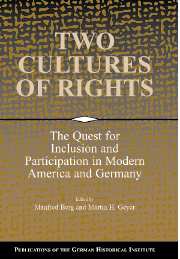Book contents
- Frontmatter
- Introduction
- Part 1 Race, Immigration, and Rights
- Part Two Civil and Social Rights
- 6 “The Right to Work Is the Right to Live!”: Fair Employment and the Quest for Social Citizenship
- 7 Social Rights and Citizenship During World War II
- 8 Just Desserts: Virtue, Agency, and Property in Mid-Twentieth-Century Germany
- 9 The Political Culture of Rights: Postwar Germany and the United States in Comparative Perspective
- 10 The Emerging Right to Information
- Part Three Gender, Sex, and Rights
- Index
9 - The Political Culture of Rights: Postwar Germany and the United States in Comparative Perspective
Published online by Cambridge University Press: 05 January 2013
- Frontmatter
- Introduction
- Part 1 Race, Immigration, and Rights
- Part Two Civil and Social Rights
- 6 “The Right to Work Is the Right to Live!”: Fair Employment and the Quest for Social Citizenship
- 7 Social Rights and Citizenship During World War II
- 8 Just Desserts: Virtue, Agency, and Property in Mid-Twentieth-Century Germany
- 9 The Political Culture of Rights: Postwar Germany and the United States in Comparative Perspective
- 10 The Emerging Right to Information
- Part Three Gender, Sex, and Rights
- Index
Summary
In comparing the development of rights-based policies in postwar Germany and America, we are confronted at once with the unique phenomenon of two Germanys. This offers the rich potential of a three-way comparison, with one point of the triangle representing a totalitarian communist state, at least until 1989. Such a tri-national comparison, however, exceeds the scope of this chapter. The analysis presented here instead concentrates on the United States and the Federal Republic of Germany since 1945. It begins with a short discursive listing of the most significant similarities between postwar Germany and America, particularly as it relates to civil rights issues and policy, and is followed by a list of the most striking differences. Beginning this way offers two advantages: First, it provides a general orientation to cross-national comparisons that will concentrate on a specific policy field, in this case the civil rights of minorities and women. Second, it demonstrates the inadequacy of such generalist comparisons in the absence of a theoretical foundation.
Let me start by listing political variables. The first political similarity is formal and structural: Both nations are constitutional republics. In the postwar era they have been characterized by representative policy-making branches, a federal system of shared powers, a broad voting franchise, written guarantees of citizen rights, and an independent national judiciary with authority to review the constitutionality of legislation.
- Type
- Chapter
- Information
- Two Cultures of RightsThe Quest for Inclusion and Participation in Modern America and Germany, pp. 189 - 204Publisher: Cambridge University PressPrint publication year: 2002
- 10
- Cited by

